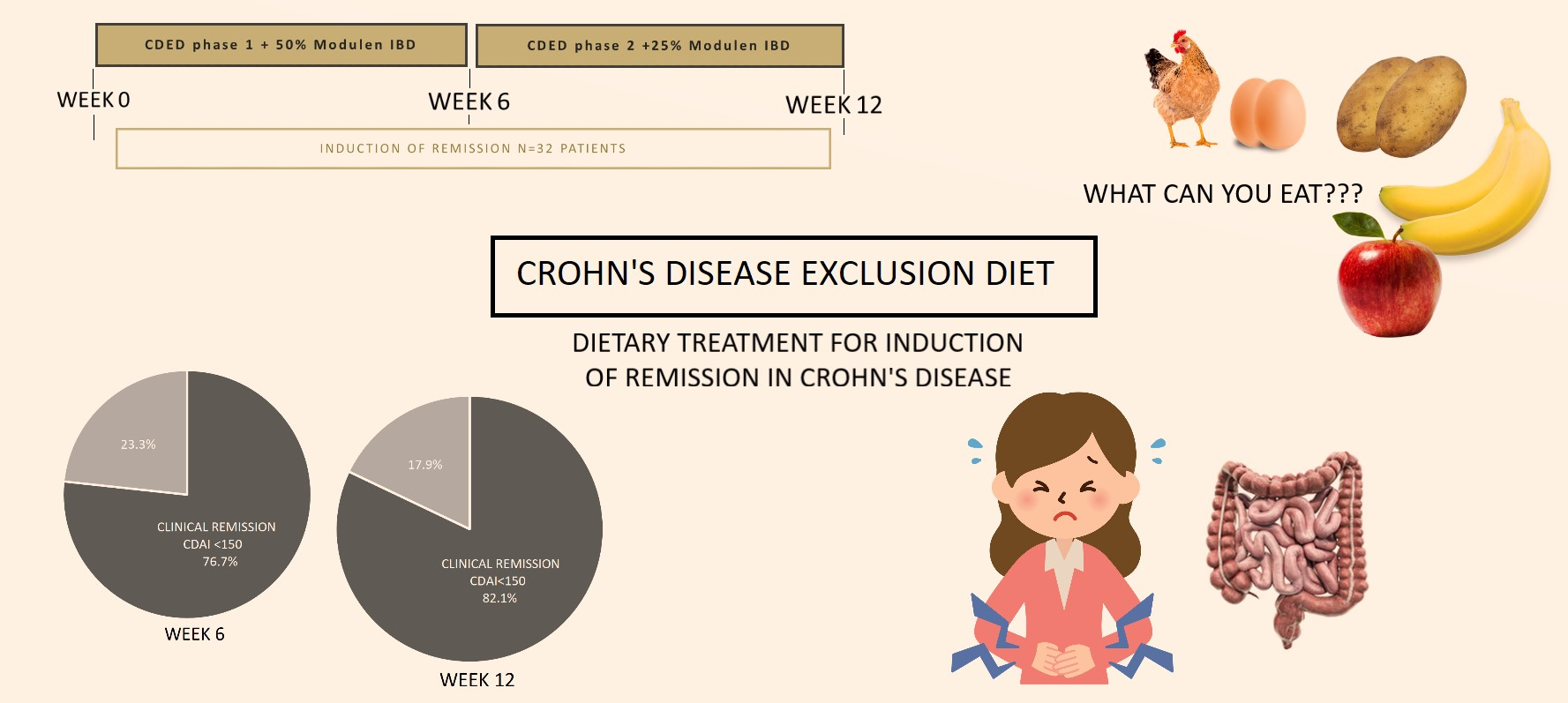Crohn's disease is an inflammatory bowel disease that describes inflammation of your large intestine (colon) symptoms include abdominal pain, severe diarrhea, malabsorption, fatigue, weight loss, malnutrition, blood in stool; Exclusive enteral nutrition (een) is recommended for children with mild to moderate crohn's disease (cd), but implementation is challenging.


Allopurinol, boswellia serrata (frankincense or shallaki), artemesia species (wormwood.



Crohn's disease exclusion diet pdf. A prospective randomised controlled trial. Sidney haas, a pediatrician, in the 1920õs as treatment for celiac disease. In ulcerative colitis, the colon is inflamed and the small intestine works normally.
Dietary therapy with the crohn's disease exclusion diet is a successful strategy for induction of remission in children and adults failing biological therapy. Nutrition and crohn’s disease there is no special diet for people with crohn’s disease. There, doctors recommend a daily diet that includes eggs, yogurt, fruit, vegetables, legumes, brown rice, miso, and pickled vegetables, along with the occasional glass of milk and green tea.
This very efficacious approach leads to high rates of remission, especial. With crohn’s disease, often the. Exclusive enteral nutrition involves the use of a complete liquid diet, with the exclusion of normal dietary components for a defined period of time, as a therapeutic measure to induce remission in active crohn's disease (cd).
Diet and dysbiosis are key environmental factors in crohn’s disease pathogenesis. Elemental diet is as effective in producing remission of crohn's disease (cd) as is corticosteroid treatment, but most patients relapse soon after resumption of a normal diet. This means that research has not shown any particular foods either help or worsen disease activity.
We have investigated the efficacies of dietary modification and oral corticosteroids in maintaining remission achieved with elemental diet. Identify the food groups, dietary components, and food additives to address with patients; Welcome to crohn's forum, a support group for people with all forms of ibd.
The crohn’s disease exclusion diet (cded) is a novel dietary therapy specifically designed for patients with crohn’s disease that uses whole food with partial enteral nutrition to achieve remission and reduce inflammation. Exclusive enteral nutrition induces remission and mucosal healing: Data on the efficacy of the newly established dietetic treatment of crohn's disease (cd), the cd exclusion diet (cded), are scarce.
The diet can be loosely defined as a progressive high protein, low. In this course, you’ll review the evidence related to the pathophysiology of inflammatory bowel diseases and their current therapies; For crohn's disease, the supplements for which clear benefits occurred in at least two studies were:
Crohn’s disease is incurable and treatment is largely directed at relieving symptoms, hence managing their diet is a very important aspect for most crohn’s patients. The crohn's disease exclusion diet (cded), a whole food diet specifically designed for patients with crohn's disease, coupled with partial enteral nutrition was found to induce remission in 80% of children in a randomised controlled trial, which was not significantly different from the 75% remission rate observed in children receiving exclusive enteral nutrition for 6 weeks. The main mechanism appears to be exclusion of free diet.
However, ensuring good nutrition is an important part of managing crohn’s disease. And discuss implementation of the crohn's disease exclusion diet with patients in clinical practice. Originally presented as a live webinar on november 11, 2020.
New findings a novel crohn’s disease exclusion diet, coupled with partial enteral nutrition, was better tolerated than This diet calls for limited animal proteins—fish once a week and meat just once every two weeks. While this community is not a substitute for doctor's advice and we cannot treat or diagnose, we find being able to communicate with others who have ibd is invaluable as we navigate our.
It was developed by dr. In 1987, elaine gottschall published òbreaking the vicious cycleó, after her daughterõs inßammatory bowel disease (ibd) improved with use

















